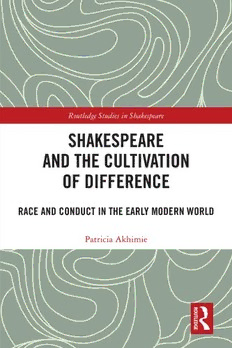
Shakespeare and the cultivation of difference : race and conduct in the early modern world PDF
Preview Shakespeare and the cultivation of difference : race and conduct in the early modern world
Shakespeare and the Cultivation of Difference Shakespeare and the Cultivation of Difference reveals the r elationship between racial discrimination and the struggle for upward social mobility in the early modern world. Reading Shakespeare’s plays alongside con- temporaneous conduct literature—how-to books on self- improvement— this book demonstrates the ways that the pursuit of personal improvement was accomplished by the simultaneous stigmatization of particular kinds of difference. The widespread belief that one could better, or cultivate, oneself through proper conduct was coupled with an equally widespread belief that certain markers (including but not limited to “blackness”), indicated an inability to conduct oneself properly, laying the foundation for what we now call “racism.” A careful reading of Shakespeare’s plays reveals a recurring critique of the conduct system voiced, for example, by malcontents and social climbers like Iago and Caliban, and embod- ied in the struggles of earnest strivers like Othello, Bottom, Dromio of Ephesus, and Dromio of Syracuse, whose bodies are bruised, pinched, blackened, and otherwise indelibly marked as un-cultivatable. By ap- proaching race through the discourse of conduct, this volume not only exposes the epistemic violence toward stigmatized others that lies at the heart of self-cultivation, but also contributes to the broader definition of race that has emerged in recent studies of cross- cultural encounter, colonialism, and the global early modern world. Patricia Akhimie is Assistant Professor of English at Rutgers University— Newark. She is co-editor of Travel and Travail: Early Modern Women, English Drama, and the Wider World (University of Nebraska Press), with Bernadette Andrea. Her research has been supported by the Ford Foundation, the John Carter Brown Library, and the National Sporting Library. Routledge Studies in Shakespeare For a full list of titles in this series, please visit www.routledge.com. 20 Shakespeare, Italy, and Transnational Exchange Early Modern to the Present Edited by Enza De Francisci and Chris Stamatakis 21 Shakespeare and Complexity Theory Claire Hansen 22 Women and Mobility on Shakespeare’s Stage Migrant Mothers and Broken Homes Elizabeth Mazzola 23 Renaissance Ecopolitics from Shakespeare to Bacon Rethinking Cosmopolis Elizabeth Gruber 24 Shakespeare’s Lost Playhouse Eleven Days at Newington Butts Laurie Johnson 25 Shakespeare’s Hamlet in an Era of Textual Exhaustion Edited by Sonya Freeman Loftis, Allison Kellar, and Lisa Ulevich 26 Shakespeare’s Suicides Dead Bodies That Matter Marlena Tronicke 27 The Fictional Lives of Shakespeare Kevin Gilvary 28 Jonson, Shakespeare, and Aristotle on Comedy Jonathan Goossen 29 Shakespeare and the Cultivation of Difference Race and Conduct in the Early Modern World Patricia Akhimie Shakespeare and the Cultivation of Difference Race and Conduct in the Early Modern World Patricia Akhimie First published 2018 by Routledge 711 Third Avenue, New York, NY 10017 and by Routledge 2 Park Square, Milton Park, Abingdon, Oxon OX14 4RN Routledge is an imprint of the Taylor & Francis Group, an informa business © 2018 Taylor & Francis The right of Patricia Akhimie to be identified as author of this work has been asserted by her in accordance with sections 77 and 78 of the Copyright, Designs and Patents Act 1988. All rights reserved. No part of this book may be reprinted or reproduced or utilised in any form or by any electronic, mechanical, or other means, now known or hereafter invented, including photocopying and recording, or in any information storage or retrieval system, without permission in writing from the publishers. Trademark notice: Product or corporate names may be trademarks or registered trademarks, and are used only for identification and explanation without intent to infringe. Library of Congress Cataloging-in-Publication Data CIP data has been applied for. ISBN: 978-0-8153-5643-1 (hbk) ISBN: 978-1-3511-2504-8 (ebk) Typeset in Sabon by codeMantra For M and for PJ Contents List of Figures ix Acknowledgements xi Introduction 1 1 Othello, Blackness, and the Process of Marking 49 2 “Bruised with Adversity”: Race and the Slave/ Servant Body in The Comedy of Errors 83 3 “Hard-Handed Men”: Manual Labor and Imaginative Capacity in A Midsummer Night’s Dream 117 4 “Fill Our Skins with Pinches”: Cultivating Calibans in The Tempest 151 5 Coda: Pedestrian Check 187 Bibliography 195 Index 215 List of Figures I.1 Title page, The Arte of Riding the Great Horse, 1628 2 I.2 “Aethiopem lavare,” A Choice of Emblemes, 1586 4 I.3 Chart comparing skulls labeled “Caucasian,” “Mongol,” and “Negro,” Types of Mankind, 1854 6 I.4 Chart comparing profiles and skulls labeled “Greek,” “Creole Negro,” and “Young Chimpanzee,” Types of Mankind, 1854 7 I.5 Title page, The Secrets of Angling, 1613 15 I.6 Title page, The Booke of Faulconrie or Hauking, 1575 29 3.1 Title page, The Noble Art of Venerie or Hunting, 1575 121 3.2 Hand-colored woodcut depicting the water pageant at Elvetham, The Honourable Entertainment Given to the Queenes Majestie in Progresse at Eluetham in Hampshire, 1591 123 3.3 Engraving by Wenceslaus Hollar, “The Prospect of Kenilworth Castle,” The Antiquities of Warwickshire, 1656 125 3.4 Woodcut illustration from the chapter “The Englishe manner, in breaking vp of the Deare,” The Noble Art of Venerie or Hunting, 1575 139 3.5 Woodcut illustration from the chapter “The place where and howe an assembly should be made, in the presence of a Prince,” The Noble Art of Venerie or Hunting, 1575 140 4.1 Engraving by Étienne Delaune depicting workers cutting and bearing logs from a series representing the agricultural labor associated with each month, “February,” The Labors of the Months, 1561–1572 162 4.2 Design for a pair of “Nyppers,” for pulling weeds without damaging corn stalks, Markhams Farwell to Husbandry, 1620 168 5.1 Plan for an orchard and gardens surrounded by walks and woods, A New Orchard and Garden, 1618 188
